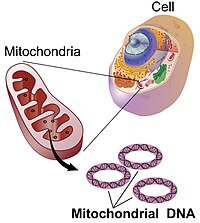
Photo from wikipedia
The biological variability of semen and sperm DNA fragmentation (SDF) parameters in a longitudinal intrauterine insemination (IUI) trial over multiple IUI cycles was investigated. A TUNEL assay was used for… Click to show full abstract
The biological variability of semen and sperm DNA fragmentation (SDF) parameters in a longitudinal intrauterine insemination (IUI) trial over multiple IUI cycles was investigated. A TUNEL assay was used for SDF testing, both before and after density gradient centrifugation. A significant age effect was observed: while semen parameters deteriorated with advancing age, on average, higher SDF values were observed for older males. There was quite some variability observed for both semen and SDF variables. Using fertile threshold values, three patient categories were distinguished: those with a high SDF in all samples, those with low SDF in all samples and those who fluctuated between high and low during the whole IUI trial. Density gradient centrifugation increases SDF. However, the three patient categories react differently after semen processing. A large percentage of those with high SDF retain their high SDF even after gradient centrifugation. The SDF fluctuaters react with a high SDF after gradient centrifugation. The low SDF category, on the contrary, distributes itself evenly between the three categories after gradient centrifugation. SDF testing after semen processing might be indispensable for therapeutic purposes, probably influencing medical decision-making. In order to isolate fluctuaters, a second SDF testing might be advocated in certain cases. SDF after semen processing is indispensable for therapeutic management.
Journal Title: Life
Year Published: 2022
Link to full text (if available)
Share on Social Media: Sign Up to like & get
recommendations!